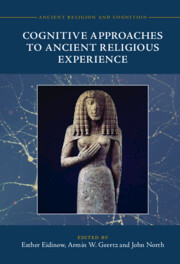Book contents
- Cognitive Approaches to Ancient Religious Experience
- Ancient Religion and Cognition
- Cognitive Approaches to Ancient Religious Experience
- Copyright page
- Contents
- Figures and Tables
- Contributors
- Abbreviations
- Funder Acknowledgement
- Introduction
- Part I Ritual
- Part II Representation
- Part III Gender
- Part IV Materiality
- Part V Texts
- Index
- References
Introduction
Published online by Cambridge University Press: 28 July 2022
- Cognitive Approaches to Ancient Religious Experience
- Ancient Religion and Cognition
- Cognitive Approaches to Ancient Religious Experience
- Copyright page
- Contents
- Figures and Tables
- Contributors
- Abbreviations
- Funder Acknowledgement
- Introduction
- Part I Ritual
- Part II Representation
- Part III Gender
- Part IV Materiality
- Part V Texts
- Index
- References
Summary
This volume arises from a project that brought together cognitive scientists of religion (CSR) in face-to-face contact with historians and other scholars in the humanities concerned with the religious history of antiquity in a series of meetings and conferences: some held in the UK, some in Denmark. The objective was to provide up-to-date historical data for cognitive scientists to analyze, up-to-date theories about cognition for historians to exploit, and an opportunity for both groups to discuss the contributions they could offer one another, through bringing the two disciplines (traditionally quite separate) together. This volume seeks to extend this project through a collection of essays mostly by those scholars. Each chapter reports on a problem of understanding that arises from some ancient religious activity and seeks to bring together the different insights of the two disciplines.
- Type
- Chapter
- Information
- Cognitive Approaches to Ancient Religious Experience , pp. 1 - 16Publisher: Cambridge University PressPrint publication year: 2022



